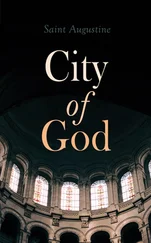11. Of the fall of the first man, in whom nature was created good, and can be restored only by its Author.
But because God foresaw all things, and was therefore not ignorant that man also would fall, we ought to consider this holy city in connection with what God foresaw and ordained, and not according to our own ideas, which do not embrace God's ordination. For man, by his sin, could not disturb the divine counsel, nor compel God to change what He had decreed; for God's foreknowledge had anticipated both,—that is to say, both how evil the man whom He had created good should become, and what good He Himself should even thus derive from him. For though God is said to change His determinations (so that in a tropical sense the Holy Scripture says even that God repented [86]), this is said with reference to man's expectation, or the order of natural causes, and not with reference to that which the Almighty had foreknown that He would do. Accordingly God, as it is written, made man upright, [87]and consequently with a good will. For if he had not had a good will, he could not have been upright. The good will, then, is the work of God; for God created him with it. But the first evil will, which preceded all man's evil acts, was rather a kind of falling away from the work of God to its own works than any positive work. And therefore the acts resulting were evil, not having God, but the will itself for their end; so that the will or the man himself, so far as his will is bad, was as it were the evil tree bringing forth evil fruit. Moreover, the bad will, though it be not in harmony with, but opposed to nature, inasmuch as it is a vice or blemish, yet it is true of it as of all vice, that it cannot exist except in a nature, and only in a nature created out of nothing, and not in that which the Creator has begotten of Himself, as He begot the Word, by whom all things were made. For though God formed man of the dust of the earth, yet the earth itself, and every earthly material, is absolutely created out of nothing; and man's soul, too, God created out of nothing, and joined to the body, when He made man. But evils are so thoroughly overcome by good, that though they are permitted to exist, for the sake of demonstrating how the most righteous foresight of God can make a good use even of them, yet good can exist without evil, as in the true and supreme God Himself, and as in every invisible and visible celestial creature that exists above this murky atmosphere; but evil cannot exist without good, because the natures in which evil exists, in so far as they are natures, are good. And evil is removed, not by removing any nature, or part of a nature, which had been introduced by the evil, but by healing and correcting that which had been vitiated and depraved. The will, therefore, is then truly free, when it is not the slave of vices and sins. Such was it given us by God; and this being lost by its own fault, can only be restored by Him who was able at first to give it. And therefore the truth says, "If the Son shall make you free, ye shall be free indeed;" [88]which is equivalent to saying, If the Son shall save you, ye shall be saved indeed. For He is our Liberator, inasmuch as He is our Saviour.
Man then lived with God for his rule in a paradise at once physical and spiritual. For neither was it a paradise only physical for the advantage of the body, and not also spiritual for the advantage of the mind; nor was it only spiritual to afford enjoyment to man by his internal sensations, and not also physical to afford him enjoyment through his external senses. But obviously it was both for both ends. But after that proud and therefore envious angel (of whose fall I have said as much as I was able in the eleventh and twelfth books of this work, as well as that of his fellows, who, from being God's angels, became his angels), preferring to rule with a kind of pomp of empire rather than to be another's subject, fell from the spiritual Paradise, and essaying to insinuate his persuasive guile into the mind of man, whose unfallen condition provoked him to envy now that himself was fallen, he chose the serpent as his mouthpiece in that bodily Paradise in which it and all the other earthly animals were living with those two human beings, the man and his wife, subject to them, and harmless; and he chose the serpent because, being slippery, and moving in tortuous windings, it was suitable for his purpose. And this animal being subdued to his wicked ends by the presence and superior force of his angelic nature, he abused as his instrument, and first tried his deceit upon the woman, making his assault upon the weaker part of that human alliance, that he might gradually gain the whole, and not supposing that the man would readily give ear to him, or be deceived, but that he might yield to the error of the woman. For as Aaron was not induced to agree with the people when they blindly wished him to make an idol, and yet yielded to constraint; and as it is not credible that Solomon was so blind as to suppose that idols should be worshipped, but was drawn over to such sacrilege by the blandishments of women; so we cannot believe that Adam was deceived, and supposed the devil's word to be truth, and therefore transgressed God's law, but that he by the drawings of kindred yielded to the woman, the husband to the wife, the one human being to the only other human being. For not without significance did the apostle say, "And Adam was not deceived, but the woman being deceived was in the transgression;" [89 ]but he speaks thus, because the woman accepted as true what the serpent told her, but the man could not bear to be severed from his only companion, even though this involved a partnership in sin. He was not on this account less culpable, but sinned with his eyes open. And so the apostle does not say, "He did not sin," but "He was not deceived." For he shows that he sinned when he says, "By one man sin entered into the world," [90]and immediately after more distinctly, "In the likeness of Adam's transgression." But he meant that those are deceived who do not judge that which they do to be sin; but he knew. Otherwise how were it true "Adam was not deceived?" But having as yet no experience of the divine severity, he was possibly deceived in so far as he thought his sin venial. And consequently he was not deceived as the woman was deceived, but he was deceived as to the judgment which would be passed on his apology: "The woman whom thou gavest to be with me, she gave me, and I did eat." [91]What need of saying more? Although they were not both deceived by credulity, yet both were entangled in the snares of the devil, and taken by sin.
12. Of the nature of man's first sin.
If any one finds a difficulty in understanding why other sins do not alter human nature as it was altered by the transgression of those first human beings, so that on account of it this nature is subject to the great corruption we feel and see, and to death, and is distracted and tossed with so many furious and contending emotions, and is certainly far different from what it was before sin, even though it were then lodged in an animal body,—if, I say, any one is moved by this, he ought not to think that that sin was a small and light one because it was committed about food, and that not bad nor noxious, except because it was forbidden; for in that spot of singular felicity God could not have created and planted any evil thing. But by the precept He gave, God commended obedience, which is, in a sort, the mother and guardian of all the virtues in the reasonable creature, which was so created that submission is advantageous to it, while the fulfilment of its own will in preference to the Creator's is destruction. And as this commandment enjoining abstinence from one kind of food in the midst of great abundance of other kinds was so easy to keep,—so light a burden to the memory,—and, above all, found no resistance to its observance in lust, which only afterwards sprung up as the penal consequence of sin, the iniquity of violating it was all the greater in proportion to the ease with which it might have been kept.
Читать дальше












